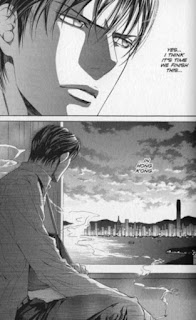 I recently read through BL's Special Edition Volumes of Finder, 1-8.
I recently read through BL's Special Edition Volumes of Finder, 1-8.The most impressive aspect of the eight volumes is that the relationship between Asami and Akihito changes. It isn't a "once the trope has been established, nothing else can happen" kind of storyline.
In fact, Akihito is established early on as having a non-static personality. He is precisely the type of person who will change as he encounters new events, even as his core personality remains the same.
As I wrote earlier, Asami is attracted to Akihito precisely because he avoids Fei Long's more negative traits. Akihito encapsulates all of Fei Long's high maintenance idiosyncrasies but without the angst or lack of confidence.
 |
| A fundamental similarity between |
| Asami and Akihito: they both take |
| responsibility for their choices/past. |
That is, it isn't merely Akihito's "hey, how can I get into danger this volume?" behavior or his brash self-confidence that attracts Asami. It's his clear-sighted assessment of other people's actions. In the course of the first five volumes, for instance, he confronts a corrupt police officer (unwisely since he misreads the man's fight or flight response), deliberate erases Asami's disc of underworld information, chooses to place his friends' safety over Asami's--then takes responsibility for his choice--and scoffs at Fei Long's angsty insistence that his relationship with Asami is "complicated."
"You sound like a college kid with a grudge," Akihito responds, only backing down when Fei Long resorts to threats.
Asami also threatens although his threats are rather like Gibbs' threats: simple statements of reality. And Asami, unlike everyone else who deals with and misreads Akihito, takes great care to never crush Akihito's spirit. His main worry during the Hong Kong kidnapping (these books, like many manga series, are full of H. Rider Haggard-type action) is that Akihito will have lost, for lack of a better term, his piss & vinegar.
 |
| Akihito: "In the end, it doesn't matter |
| what he says. It's not his problem. |
| It's mine." |
Akihito has lots of stuff happen to him. But ultimately, his character growth resides in his responses/decisions. The tension for Akihito is between his honest and accurate moral judgments and his growing affection for the seemingly amoral Asami. Akihito comes to question not Asami's actions (as he did in the beginning) but Asami's motivations. And he is forced to ask himself, "Once I know all the truth, what will I decide?"
